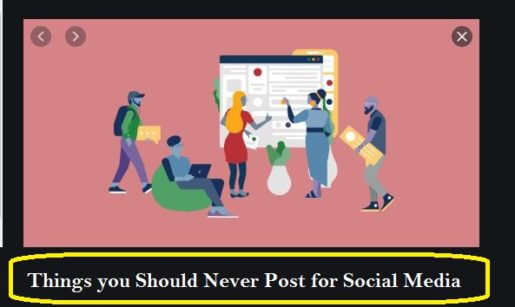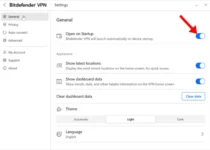Social media is an insecure place to post everything !! In today’s article, we discuss things that you should not share or post on social media and why …
Social networks are an insecure place, and this has been proven in past years, as the most popular networks used by millions around the world sell user data, not only that,
but there is another personal risk level when sharing things that should not have been shared on Social media. ,
So as not to be exposed to the many threats awaiting users in this unlimited open world.
In this article, we take a look at some things that should not be shared on social media. Sharing these things can harm your privacy and safety.
1. Travel and excursion plans
Think twice before showing your next great vacation or posting photos during the weekend trip. You never know who can see this information and use it to break into your home during your absence.
If someone knows your residence and has malicious intent, knowing that you will be thousands of kilometers away for two weeks or more is an open invitation to steal your home.
As a safer alternative, do not share any details or photos about your trip or summer vacation until after you return. While this is less exciting, it does not announce to the world that you are not at home for a long time.
2. Geographical location data
In addition to tracking the GPS coordinates of your smartphone, your browser also has a general idea of your location based on your IP address or login accounts. This is called a geographic location, and it is often used on social media to mark your post on your current location.
Before posting to any social network, check to see if the site automatically adds your site data and disables it before publishing. Most of the time, there is no reason to share your location with everyone who can see the post.
Did you also know that most images contain metadata showing the exact location of the image? If you are not aware of this, the photos you post on social media may jeopardize your privacy.
This warning is also related to not publishing your physical address or phone numbers. You should never share your address or phone number on a public site, because you never know who can get this information or how to use it.
3. Personally Identifiable Information
Sites like Facebook are full of valuable data for people who use social engineering to steal your identity on social media. So you should avoid sharing information used to verify your identity, such as your full birthday. Do not share photos of driver’s licenses, passports, or credit cards that contain personal information that you do not want to publish publicly.
It is also important to watch “fun competitions” that organize social media tours every now and then. They ask you to answer questions such as where did you go to school, what is the name of your first pet, and others.
These types of questions are often used as security questions to protect your online accounts. Therefore, making these answers public can allow hackers to compromise your accounts, so avoid them.
4. Personal complaints and grievances
Social media is not the place to express your personal grievances. If you want to complain about your manager, coworkers, or relatives, social media is a terrible place to do that. He can be seen by someone between you and his enmity or just because he hates and tells him, which leads to a problem for you.
Many people use their social media accounts as a place to complain, for some reason. As an appropriate alternative, why not start creating your own blog where you can cross it as you want? Whatever you choose to do, keeping your anger out of the social media scene is a smart idea and avoids problems.
Note that many companies provide customer service and technical support on social media, so this does not apply to getting help with a legitimate complaint.

5. Things that may condemn you or put you under the law
Although you certainly sometimes need to express something or consider it a joke or a joke, it is quite another to violate the law and leave evidence on social media for all to see that can condemn you.
You are unlikely to see any truly heinous crimes being recognized on Facebook or Twitter. However, sometimes you may encounter accidents in which people mock drunk driving or taking portraits on the highway, etc.
Some even share pictures of illegal drug caches, firearms, or the money they stole. This also applies to the clear pictures that appear in it – it is a terrible idea to post it on any social platform.
Serve to everyone (including yourself) by not posting anything of that nature to social media. Few of the likes you might get are not worth the damage to your reputation or even going to prison for committing a crime
6. New expensive purchases
Many people like to share photos of their new things on social media. Whether you’ve just got a new phone, laptop, car, TV, jewelry, or anything else, you shouldn’t make the purchase public on social media.
For starters, these types of posts contribute to a huge problem affecting most social networks: social media increases our insecurity and feelings of failure. When you post prominent sections of your life, this may inadvertently cause others to be jealous, resentful, or resentful towards you, and look at you with envy and wish for what you have that could harm your life.
The second reason is more practical. Telling the world that you have something new and too expensive can cause some people to steal it, or to exploit you in some way, and to deceive you. Also to announce to the people that you are rich and have a lot of money. If people think you’re well off, they might be looking to use that to their advantage.
7. Personal advice and counseling
We’ve all seen people ask for home sickness treatments or legal advice for an issue on social media. Regardless of your knowledge and experience, it is in everyone’s interest (including yours) not to provide medical or legal advice to people via social media. This is true even if you are a doctor or a lawyer.
The main point is that you simply (cannot) know all the facts and aspects of each person’s matter. If someone is ill or in trouble, they should seek professional help. This also applies to advice on exercise, weight loss, diet, finance and other sensitive topics.
It’s best to keep silent about all of this because if you give advice that ends up hurting someone, they can follow up on legal procedures against you.
8. Participate in fraudulent gifts and contests
Social networks are the main ways for companies to run competitions with the aim of increasing interaction and awareness of brands and it is one of the popular forms of marketing, mainly due to the ease of clicking “share” and not thinking about it twice. While there are a lot of legitimate and real gifts on Facebook and others, you should think carefully before sharing them all the time.
If you constantly participate in giveaways, contests and invitations to Facebook games, you will likely bother your friends. And most importantly, some of these alleged contests are actually convincing tricks. You can spread malware or trick people into giving sensitive data.
To be on the safe side, you must be careful of all posts that strongly encourage participation and ask for personal details.
9. Confidential internal information
It is wrong to accidentally post private information on a public social network. However, you should be careful about exposing internal information on social media. If you are aware of the secured and confidential details of your work, do not share it anywhere, especially online.
Talking about someone who will be laid off next week, spreading your company’s new year strategy and other insider information could lead to big problems.
10. Anything you don’t want to publish
Anything not mentioned in the article above. If there is one rule that you have to live with on social media, this is: Don’t post anything you don’t want the whole world to see.
On the Internet, once something is posted, it is impossible to completely remove it. Even if you set your content to “friends only”, there is no way to know who actually saw your posts and photos, saved or shared with someone else.
So if you post something today that you can regret for years, you may be able to delete it from your account, but it cannot be completely erased from the internet. A good basic rule is not to post or share anything you don’t want to put on a newspaper’s front page.









